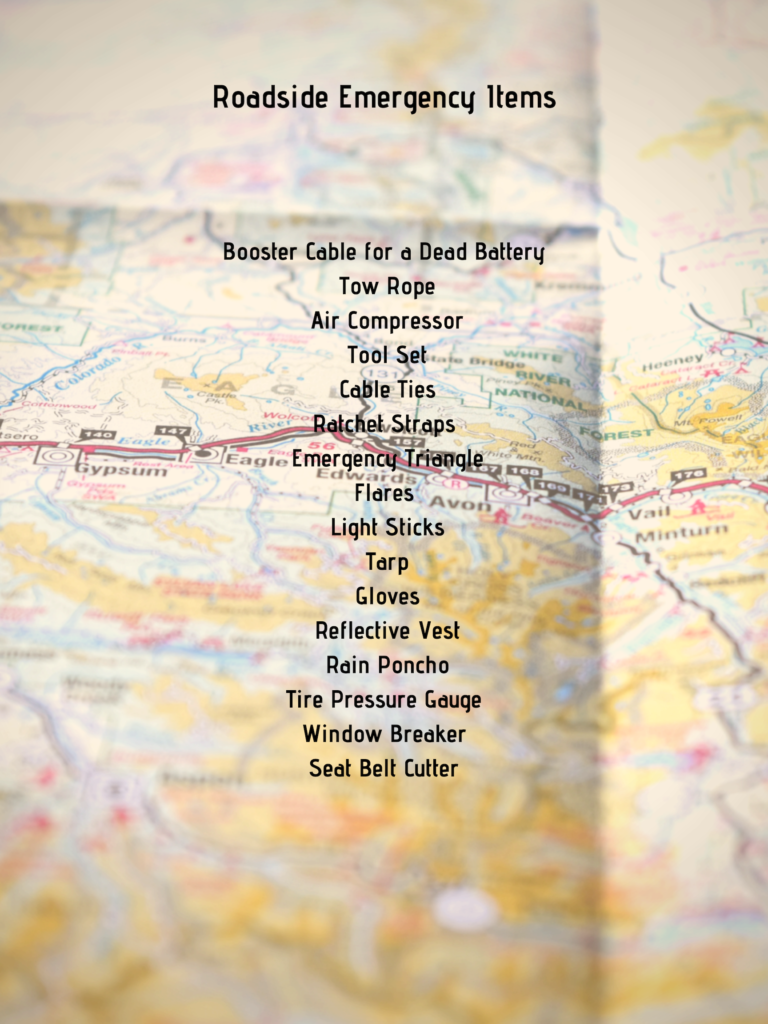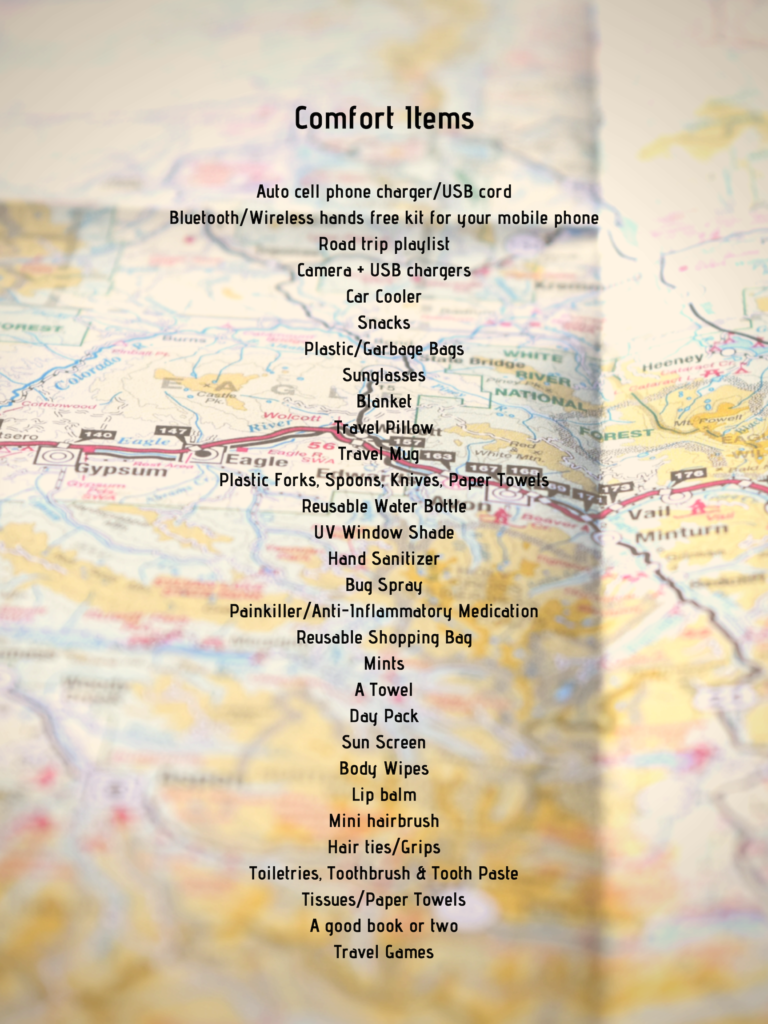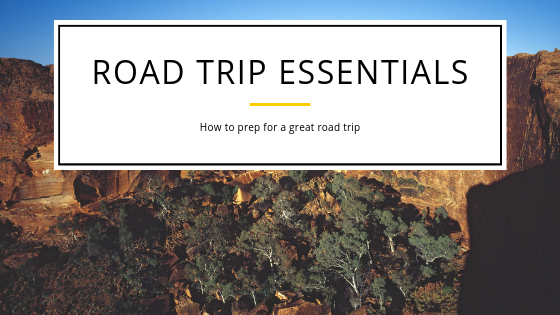I love going on road trips. Through my travels, I’ve found that there are some essentials that you should always take with you, some that make the trip more enjoyable, and some things you want to have handy in case of spur of the moment decisions (such as extending your trip or getting side tracked to another destination).
Here are some helpful suggestions of items you might want to take when going on a road trip:
BEFORE YOU GO
Keep in mind you may not always have access to cell or Wi-Fi service.
We take for granted how easy it is to use our cell phones for everything. But, even as advanced as we are in this world, cell service and Wi-Fi may not be available everywhere. In some places, your carrier may not even provide service or have coverage. If you have a plan that does not allow for roaming or you have data usage limitations, your phone ultimately turns into an expensive flashlight.
Have a Plan
For some, the whole reason why you’re going away on a trip is to disconnect. But it’s when you need your phone the most – when you’re looking for directions or need to get help – that’s when the panic sets in.
To help avert any scary situations, let people know where you’re going and estimated time of arrival. Check in when you can so if something happens, there’s a time of reference from the last point of contact. There are apps out there that can tell you what kind of service an area may or may not have. Your carrier should also have coverage maps available. Have a plan, be prepared and be smart about traveling – especially if you are traveling alone.
IS YOUR VEHICLE PREPARED?
License/Registration/Car Insurance Information/Relevant Contact Numbers
Obvious…but it doesn’t hurt to ensure you have this information readily available before you go.
Car Maintenance
Is your vehicle in shape for travel? If not or if it is questionable, don’t take the chance. You want to enjoy your trip, not breakdown and spend more money than you intended to.
Car Rental Option
An option to consider is car rental. There are lots of advantages to utilizing car rentals. Most rental companies have a variety of newer cars, trucks and SUVs to choose from. They are generally well maintained and after each use will go through a process to ensure that they are drivable. This option can also help limit additional wear and tear to your own vehicle.
Make Sure Your Vehicle Is Right For The Terrain
For instance, if you are traveling to a location where the roads are rated for “4×4 or high clearance use” only, do not assume that your coupe or sedan is suitable for driving on that particular type of road. The last thing you want is to be stuck in the middle of nowhere needing to be towed out.
Check The Weather
Depending on the season, the weather can change at a moments notice. This is especially important if you’re not familiar with the location that you are traveling to or what the typical weather patterns are for the area. Be aware of the forecast for your travel and destination.
Your Car Owners Manual
If you have it…great! If not, consider downloading a manual to your phone that you can reference in case you are offline and don’t have access to cell or Wi-Fi service.
Spare Tire
Check the one you have is in good condition. It would also be advantageous to learn how to change a tire. There are a million YouTube videos out there that you can watch!
ARE YOU PREPARED?
AAA Or Some Kind Of Roadside Assistance Service
Nice to have in case of an emergency. Most car insurance carriers and credit card companies offer some kind of roadside assistance. Even the brand of your vehicle might offer a service. There are some free apps out there as well that can also get you in touch with a service.
Cash
Some places will only take cash. You might need it for tolls, parking fees, that little stand by the side of the road or that cute mom and pop restaurant.
Paper Maps/Free Map App
Paper Maps – because as stated earlier, cell service is not available everywhere. Another option is to utilize map apps and download detailed maps, which can be used offline without cell service.
Satellite GPS Messenger / Personal Location Beacons (PLBs)
This falls under the category of “nice to have”. This is more for people who really want to go off the grid, but anyone can benefit from these devices. The price of Satellite GPS communicators and PLBs can range in price from $100 and up, plus a subscription service. But, in the event of an emergency and you cannot get a cell phone signal, this added layer of safety can’t be beat.
Roadside Emergency Kit
These kits come in a variety of sizes and prices depending on what’s in the kit. Some are very basic and some are fully loaded. You could probably put one together on your own, but in terms of cost you’re better off buying one that is already set up. Some of them even come with offers for Roadside Assistance.

First Aid Kit
Basic supplies such a band-aids, bandages, gauze, antiseptic and safety pins can be invaluable when the closest town 100 miles away.
Flashlight
Flashlights are not always something people think of until they need one. Buy two. It means you’ll have a spare. Make sure you have extra batteries as well!
Umbrella
Swiss Army Knife/Multi-Tool
A Notebook/Pen/Pencil
For either jotting down your thoughts or leaving a note of the car you accidentally ‘bumped’.
Large Water Bottles
If you get stranded, staying hydrated is crucial. Keep a couple of large bottles in the car in case of emergencies.
Toilet Roll
Don’t get caught short in a un-stocked rest stop!
Snow Shovel/Ice Scraper
For Winter driving or cold destinations.
Stay Connected, Comfortable & Entertained On Your Road Trip

Hopefully you will find these suggestions helpful in planning your trip. As with any form of travel, the number one priority is arriving safely at your destination. The number two priority is to have fun, enjoy yourself and create memories that will last a lifetime.
Safe Travels!!!

